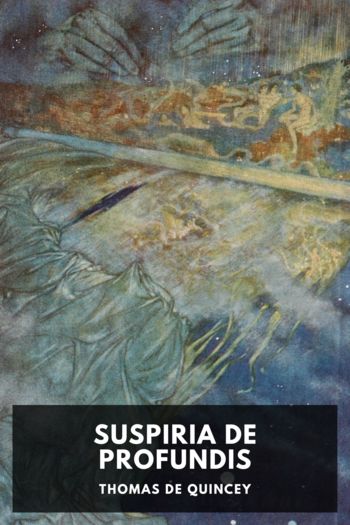Suspiria de Profundis by Thomas De Quincey (urban books to read .TXT) 📕

- Author: Thomas De Quincey
Book online «Suspiria de Profundis by Thomas De Quincey (urban books to read .TXT) 📕». Author Thomas De Quincey
How else, for example, than as a constant watcher for the dawn, and for the London mail that in summer months entered about daybreak amongst the lawny thickets of Maryborough forest, couldst thou, sweet Fanny of the Bath road, have become the glorified inmate of my dreams? Yet Fanny, as the loveliest young woman for face and person that perhaps in my whole life I have beheld, merited the station which even now, from a distance of forty years, she holds in my dreams; yes, though by links of natural association she brings along with her a troop of dreadful creatures, fabulous and not fabulous, that are more abominable to the heart than Fanny and the dawn are delightful.
Miss Fanny of the Bath road, strictly speaking, lived at a mile’s distance from that road, but came so continually to meet the mail that I on my frequent transits rarely missed her, and naturally connected her image with the great thoroughfare where only I had ever seen her. Why she came so punctually I do not exactly know; but I believe with some burden of commissions, to be executed in Bath, which had gathered to her own residence as a central rendezvous for converging them. The mail-coachman who drove the Bath mail and wore the royal livery27 happened to be Fanny’s grandfather. A good man he was, that loved his beautiful granddaughter, and, loving her wisely, was vigilant over her deportment in any case where young Oxford might happen to be concerned. Did my vanity then suggest that I myself, individually, could fall within the line of his terrors? Certainly not, as regarded any physical pretensions that I could plead; for Fanny (as a chance passenger from her own neighbourhood once told me) counted in her train a hundred and ninety-nine professed admirers, if not open aspirants to her favour; and probably not one of the whole brigade but excelled myself in personal advantages. Ulysses even, with the unfair advantage of his accursed bow, could hardly have undertaken that amount of suitors. So the danger might have seemed slight—only that woman is universally aristocratic; it is amongst her nobilities of heart that she is so. Now, the aristocratic distinctions in my favour might easily with Miss Fanny have compensated my physical deficiencies. Did I then make love to Fanny? Why, yes; about as much love as one could make whilst the mail was changing horses—a process which, ten years later, did not occupy above eighty seconds; but then—viz., about Waterloo—it occupied five times eighty. Now, four hundred seconds offer a field quite ample enough for whispering into a young woman’s ear a great deal of truth, and (by way of parenthesis) some trifle of falsehood. Grandpapa did right, therefore, to watch me. And yet, as happens too often to the grandpapas of Earth in a contest with the admirers of granddaughters, how vainly would he have watched me had I meditated any evil whispers to Fanny! She, it is my belief, would have protected herself against any man’s evil suggestions. But he, as the result showed, could not have intercepted the opportunities for such suggestions. Yet, why not? Was he not active? Was he not blooming? Blooming he was as Fanny herself.
“Say, all our praises why should lords—”
Stop, that’s not the line.
“Say, all our roses why should girls engross?”
The coachman showed rosy blossoms on his face deeper even than his granddaughter’s—his being drawn from the ale-cask, Fanny’s from the fountains of the dawn. But, in spite of his blooming face, some infirmities he had; and one particularly in which he too much resembled a crocodile. This lay in a monstrous inaptitude for turning round. The crocodile, I presume, owes that inaptitude to the absurd length of his back; but in our grandpapa it arose rather from the absurd breadth of his back, combined, possibly, with some growing stiffness in his legs. Now, upon this crocodile infirmity of his I planted a human advantage for tendering my homage to Miss Fanny. In defiance of all his honourable vigilance, no





Comments (0)